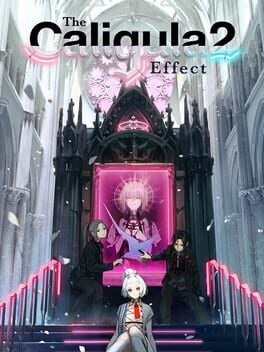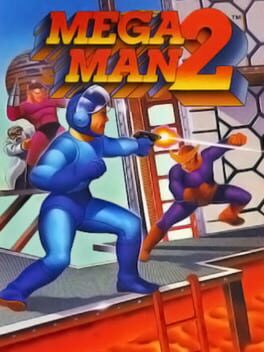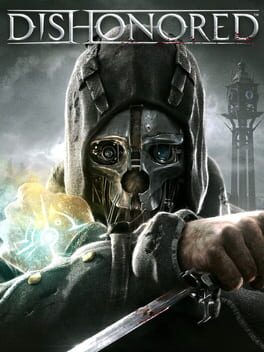Doctor_Killer
Bio
just plane wrong
just plane wrong
Badges

On Schedule
Journaled games once a day for a week straight

2 Years of Service
Being part of the Backloggd community for 2 years
072
Total Games Played
019
Played in 2024
000
Games Backloggd
Recently Played See More
Recently Reviewed See More
Bought it based off how promising the demo seemed. Bullet hell and Snake is a pretty good combination at first and, for two chapters, its gameplay loop makes for some exciting boss fights. That said, it's short and, what's somewhat worse, reuses the same pool of bosses to an excessive degree. As a result, the game ends up feeling pretty shallow.
What brings it down to two stars, for me, is that boss gimmicks from the third chapter on are more irritating than engaging and the story takes a meta turn that is, essentially, "what if Undertale and Nier Automata were incredibly undercooked and then stuffed into a blender"? It all amounts to an experience that is less than the sum of its parts when its parts were, at best, a cut above average.
What brings it down to two stars, for me, is that boss gimmicks from the third chapter on are more irritating than engaging and the story takes a meta turn that is, essentially, "what if Undertale and Nier Automata were incredibly undercooked and then stuffed into a blender"? It all amounts to an experience that is less than the sum of its parts when its parts were, at best, a cut above average.
One day, I’d like to offer some thoughts about the rest of the game but, tonight, I’m here to kill Chaos.
Dishonored on its face is a tightly crafted game. You are Corvo Attano. You’re here (Dunwall) to kick ass and protect the Empress and, thanks to a bunch of cartoon rogues and one extremely cool guy, you are all out of Empress. Well, maybe 98% out of Empress. Let’s just say you have a head full of silent protagonist and a heart full of a familiar sounding lady who knows the exact geographic location of all of Satan’s heretical artifacts. Either way, revenge is on the menu and everyone is your main course.
The game looks and sounds pretty great for its age and the setting works well. Dunwall evokes a sort of hyper-Victorian era scummy English or New English port town. Nothing looks like it’s in good shape and scientific advances are confined to cures for a horrible and mysterious zombie rat plague, guns, and security systems intended to vaporize a normal burglar. The music, ambient or otherwise, isn't much of a main attraction aside from a somewhat outrageous but undeniably catchy ending number. As sounds go, you're here for enemy chatter that's difficult to forget and a solid cast of voice actors for the main characters, aside from - conspicuously given the sequel - Corvo himself.
Gameplay works. Dishonored has a solid gamefeel that reminds me in some ways of DOOM 2016; you feel very agile and capable of parkour in a way I haven't been primed to expect from a first-person game. You have an assortment of powers which, to be honest, feel pretty eclectic. On one end, you can teleport all over the place, which feels pretty incredible and adds to how nimble Corvo is to play. On the other, you can summon giant rat mobs and tank more hits and regen faster, which...playthroughs differ, of course, but these never struck me as especially useful or fun to play with. Levels, for the most part, are all larger segments of Dunwall with some instances where you're left largely free to take guards and security devices out as quietly or visibly as you'd prefer. There's an incredible tactile satisfaction to the wrist-mounted crossbow you have that I never got tired of and that I never really picked up from other weapons the game hands you such as grenades, guns, and, barring a noteworthy exception, your cool sword.
The story isn’t going to be your main attraction. Admirably for a relatively prominent title in a larger franchise, the game answers most of the pressing questions it puts forward. The answers are all kind of ridiculous. What narrative appeal there is comes from two things and it is the second I want to really focus in on. First, the gameplay and setting come together to give the proceedings a unique character that would otherwise be pretty much nonexistent. It’s a grimy city full of outsized personalities and there is certainly something to the individuals Corvo interacts with. Satan talks to you whenever you pick up certain items that advance your character and it’s hard not to be at least a bit charmed by being beneath the watchful eye of a teenaged, socially puzzled atheist who also is responsive in some ways to your morality. Which…
Okay, yes. Let’s talk about the morality. Let’s talk about Chaos.
Dishonored is a fundamentally confused game. I wonder in some ways if it wasn’t to do with trends at the time in the broader gaming landscape but, based off developer interviews, that likely doesn’t fully capture it. You are a man left for dead out to get revenge against a heinous cabal of elitist creeps who had your wife murdered and your daughter taken. The game gives you a large suite of options in terms of how to carve your way through your enemies or, better yet, tricking them into carving themselves up against their own tools or against dark forces beyond mortal comprehension. But it is also a game that cannot help but make it clear to you that, as unbelievably awesome as killing is, it is also very wrong and you are a bad person if you indulge in it.
Now, lest anyone worry, obviously that is correct. But Dishonored feels like it was built around playing a gleeful vigilante. The Chaos System, the game’s morality meter, is violently at odds with that. You are chastised by the game for indulging in High Chaos actions but it’s so obviously the path the game is begging you to choose that the whole idea of a video game morality mechanic comes across as very confused and to the game’s detriment. A Low Chaos player has very few tools at their disposal for interacting with the game; you can sneak around and avoid being seen and either choke or tranquilize guards that you can’t avoid. This as opposed to a player less concerned with all that who can drop carnivorous rats into rooms full of people to distract them, blast people into walls with telekinesis, or resort to the visceral satisfaction of just stabbing them, picking them off with crossbow bolts, or what have you.
This is only superficially the issue. Corvo, at the end of the day, is the hero of the story no matter how gruesome his methods are. His enemies are all, barring one cool and one troubling exception, as cartoonishly evil as you could imagine. So Dishonored has to be a story of revenge no matter where any given player falls on the Chaos scale and it has very clearly obligated itself to make the player feel like, even if he isn’t a killer, his enemies get what is coming to them. Low Chaos Corvo does things that are almost absurd: he consigns foes to work as slaves in their own mines; he brands a man to live as a disease-riddled, penniless leper; he hands off a woman who may have done little wrong other than sleep with the wrong man to her stalker. It’s hard to really say any of this is much better than killing his enemies in the night. But since Corvo doesn’t actually put the knife in himself, he is a good person and Dunwall by extension is a good place.
To me, it’s a somewhat difficult to ignore flaw. It shows a game that is fundamentally at odds with itself. A game that, even without this, would still be a game that peters out at the finish line, telling the player—at one point—to kill or stun every enemy on the map with a magic electrical device rather than engage with stealth or combat in the course of the level. A game that, even if it did feel consistent, would still be a game ending on a 3D clipshow telling you that you either did good or did bad after an easy map with a host of antagonists who are not worth Corvo’s time. Make no mistake: for two-thirds of its length, Dishonored is a solid game made by people with a clear sense of what world they meant to build and with tools for a player to have a more than solid time playing at being Edmond Dantes. But it is a game that never goes past good to great because pressures either from within Arkane or from games at that time led to a product that seems fundamentally confused and unable to come to any coherent moral conclusion about what it believes you ought to be doing, to such an extent that the game itself feels less enjoyable as a whole.
Dishonored on its face is a tightly crafted game. You are Corvo Attano. You’re here (Dunwall) to kick ass and protect the Empress and, thanks to a bunch of cartoon rogues and one extremely cool guy, you are all out of Empress. Well, maybe 98% out of Empress. Let’s just say you have a head full of silent protagonist and a heart full of a familiar sounding lady who knows the exact geographic location of all of Satan’s heretical artifacts. Either way, revenge is on the menu and everyone is your main course.
The game looks and sounds pretty great for its age and the setting works well. Dunwall evokes a sort of hyper-Victorian era scummy English or New English port town. Nothing looks like it’s in good shape and scientific advances are confined to cures for a horrible and mysterious zombie rat plague, guns, and security systems intended to vaporize a normal burglar. The music, ambient or otherwise, isn't much of a main attraction aside from a somewhat outrageous but undeniably catchy ending number. As sounds go, you're here for enemy chatter that's difficult to forget and a solid cast of voice actors for the main characters, aside from - conspicuously given the sequel - Corvo himself.
Gameplay works. Dishonored has a solid gamefeel that reminds me in some ways of DOOM 2016; you feel very agile and capable of parkour in a way I haven't been primed to expect from a first-person game. You have an assortment of powers which, to be honest, feel pretty eclectic. On one end, you can teleport all over the place, which feels pretty incredible and adds to how nimble Corvo is to play. On the other, you can summon giant rat mobs and tank more hits and regen faster, which...playthroughs differ, of course, but these never struck me as especially useful or fun to play with. Levels, for the most part, are all larger segments of Dunwall with some instances where you're left largely free to take guards and security devices out as quietly or visibly as you'd prefer. There's an incredible tactile satisfaction to the wrist-mounted crossbow you have that I never got tired of and that I never really picked up from other weapons the game hands you such as grenades, guns, and, barring a noteworthy exception, your cool sword.
The story isn’t going to be your main attraction. Admirably for a relatively prominent title in a larger franchise, the game answers most of the pressing questions it puts forward. The answers are all kind of ridiculous. What narrative appeal there is comes from two things and it is the second I want to really focus in on. First, the gameplay and setting come together to give the proceedings a unique character that would otherwise be pretty much nonexistent. It’s a grimy city full of outsized personalities and there is certainly something to the individuals Corvo interacts with. Satan talks to you whenever you pick up certain items that advance your character and it’s hard not to be at least a bit charmed by being beneath the watchful eye of a teenaged, socially puzzled atheist who also is responsive in some ways to your morality. Which…
Okay, yes. Let’s talk about the morality. Let’s talk about Chaos.
Dishonored is a fundamentally confused game. I wonder in some ways if it wasn’t to do with trends at the time in the broader gaming landscape but, based off developer interviews, that likely doesn’t fully capture it. You are a man left for dead out to get revenge against a heinous cabal of elitist creeps who had your wife murdered and your daughter taken. The game gives you a large suite of options in terms of how to carve your way through your enemies or, better yet, tricking them into carving themselves up against their own tools or against dark forces beyond mortal comprehension. But it is also a game that cannot help but make it clear to you that, as unbelievably awesome as killing is, it is also very wrong and you are a bad person if you indulge in it.
Now, lest anyone worry, obviously that is correct. But Dishonored feels like it was built around playing a gleeful vigilante. The Chaos System, the game’s morality meter, is violently at odds with that. You are chastised by the game for indulging in High Chaos actions but it’s so obviously the path the game is begging you to choose that the whole idea of a video game morality mechanic comes across as very confused and to the game’s detriment. A Low Chaos player has very few tools at their disposal for interacting with the game; you can sneak around and avoid being seen and either choke or tranquilize guards that you can’t avoid. This as opposed to a player less concerned with all that who can drop carnivorous rats into rooms full of people to distract them, blast people into walls with telekinesis, or resort to the visceral satisfaction of just stabbing them, picking them off with crossbow bolts, or what have you.
This is only superficially the issue. Corvo, at the end of the day, is the hero of the story no matter how gruesome his methods are. His enemies are all, barring one cool and one troubling exception, as cartoonishly evil as you could imagine. So Dishonored has to be a story of revenge no matter where any given player falls on the Chaos scale and it has very clearly obligated itself to make the player feel like, even if he isn’t a killer, his enemies get what is coming to them. Low Chaos Corvo does things that are almost absurd: he consigns foes to work as slaves in their own mines; he brands a man to live as a disease-riddled, penniless leper; he hands off a woman who may have done little wrong other than sleep with the wrong man to her stalker. It’s hard to really say any of this is much better than killing his enemies in the night. But since Corvo doesn’t actually put the knife in himself, he is a good person and Dunwall by extension is a good place.
To me, it’s a somewhat difficult to ignore flaw. It shows a game that is fundamentally at odds with itself. A game that, even without this, would still be a game that peters out at the finish line, telling the player—at one point—to kill or stun every enemy on the map with a magic electrical device rather than engage with stealth or combat in the course of the level. A game that, even if it did feel consistent, would still be a game ending on a 3D clipshow telling you that you either did good or did bad after an easy map with a host of antagonists who are not worth Corvo’s time. Make no mistake: for two-thirds of its length, Dishonored is a solid game made by people with a clear sense of what world they meant to build and with tools for a player to have a more than solid time playing at being Edmond Dantes. But it is a game that never goes past good to great because pressures either from within Arkane or from games at that time led to a product that seems fundamentally confused and unable to come to any coherent moral conclusion about what it believes you ought to be doing, to such an extent that the game itself feels less enjoyable as a whole.






